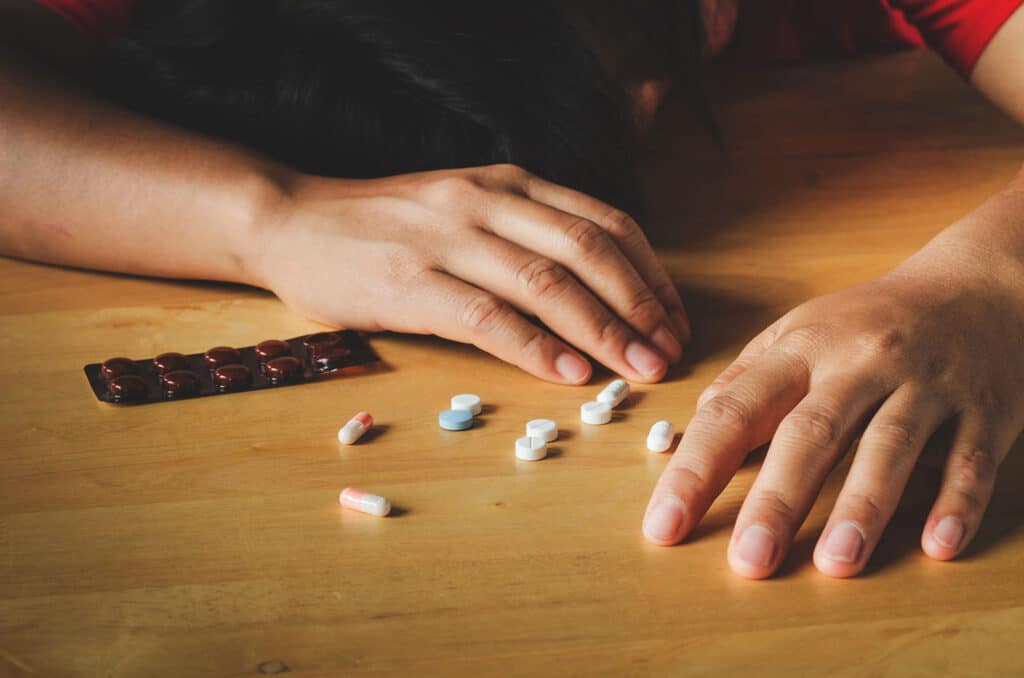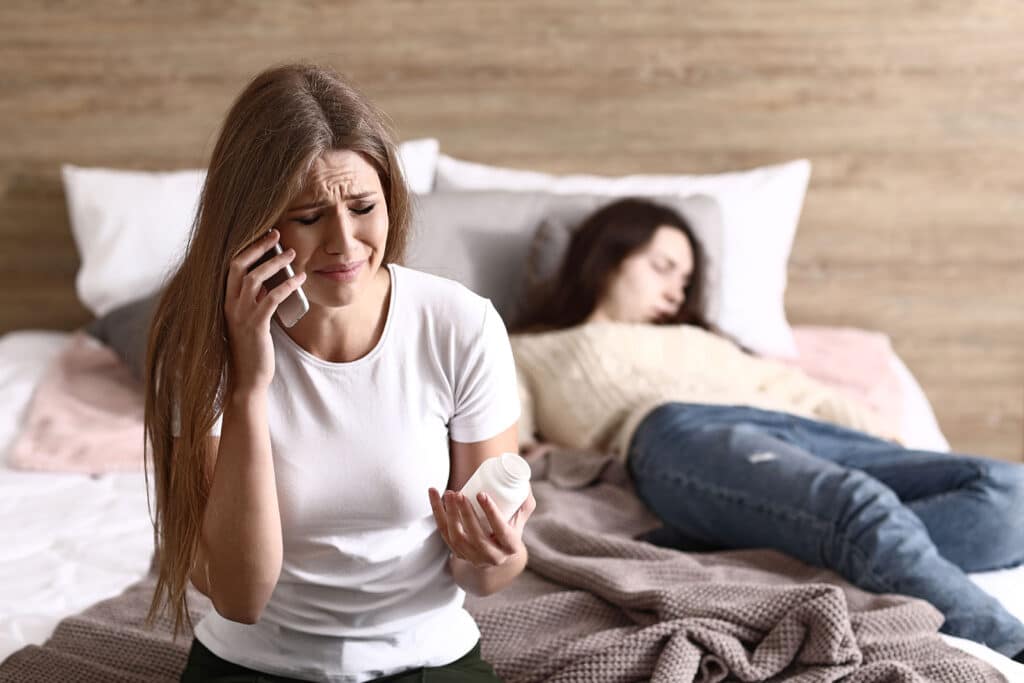Benzodiazepines, or “benzos” as they’re commonly called, have been at the center of a nationwide public drug abuse problem.
Over the past few years, the number of emergency room visits and overdose deaths related to benzodiazepine dependence has increased significantly. Evidence-based research in 2019 found that at least 2.2% of the US population abused benzodiazepines, ranking this class of substances as the third most commonly misused illicit or prescription drug.
These statistics express the addiction scene in New Jersey to the point that new legislation has been proposed to further control the prescribing and dispensing of benzodiazepines.
If you or someone you know suffers from benzo addiction, this article is here to help you begin your recovery journey.
Our guide to overcoming benzo misuse starts by explaining the effects of benzodiazepines, how their addiction develops, the signs/symptoms of this addiction, the withdrawal process, and the available treatment options.
What Are Benzo Drugs?
Benzo drugs, short for benzodiazepines, are a class of drugs that first emerged in 1955 when Hoffmann-La Roche accidentally discovered chlordiazepoxide, which was later sold under the name “Librium”.

Within a few years, scientists had formulated an improved version of chlordiazepoxide and named it “diazepam”, otherwise known as the infamous “Valium”.
The launch of Valium in the early 1960s as a medication for treating anxiety and insomnia made way for the development of a range of benzo drug variants. Among the most popular ones are:
- Alprazolam (Xanax)
- Clonazepam (Klonopin)
- Estazolam (ProSom)
- Lorazepam (Ativan)
- Flurazepam (Dalmane)
- Temazepam (Restoril)
To give benzodiazepines a clear definition, science considers them as any substance or drug containing a benzene ring fused to a diazepine ring.
This chemical combination gives this class of drugs the ability to depress the activity of the central nervous system, also known as a calming or sedating effect.
More specifically, these drugs boost the action of GABA (Gamma-aminobutyric acid) neurotransmitters which is a naturally occurring substance in the brain that promotes relaxation and lowers anxiety levels.
As such, the legit use of benzos is to treat anxiety disorders, panic disorders, muscle spasms, alcohol withdrawal, seizures, and insomnia. Some of them are also used for anesthesia before the surgery.
What Are the Effects of Benzo Substance Misuse?
According to the CSA (Controlled Substance Act), benzodiazepines are classed as Schedule IV drugs. While they aren’t as naturally addictive as Schedule III and higher drugs, they still possess a significant potential for abuse, dependence, and addiction.

The adverse effects of benzodiazepines don’t start just when a person misuses them. In general, the normal use of benzos involves a range of risks such as:
- Fatigue
- Drowsiness and dizziness
- Talkativeness
- Problems focusing
- Agitation and irritability
- Increased saliva production
- Mood shifts
- Nausea
- Constipation
- Forgetfulness
- Joint pain
- Urinating more frequently
Benzodiazepine misuse elicits a stronger calming or sedating effect, consequently, it also prompts severe side effects. As such, the side effects of benzo abuse include:
- Being overly lethargic
- Very slow reactions
- Slurred speech
- Difficulty in concentrating
- Difficulty in recollecting memories
- Frequent dizziness
- Excessive drowsiness
These effects can easily impact the person’s life, gnawing away at the social, professional, and personal aspects.
How Are Benzo Drugs Abused?
Under normal circumstances, benzos are taken orally as whole pills designed to dissolve gradually to ensure continuous release of their active dosage over a certain period. This way, the patient experiences the drug’s therapeutic action for an extended time instead of all at once.
Benzo misuse, however, is a different story. It typically involves crushing the pills and snorting them, as well as smoking or even injecting the drug.
Abusing benzos can also happen when patients take too many pills at one go or too frequently. Additionally, some people try to speed up the effects of these drugs by chewing the medication before swallowing it.
Other than these methods, benzodiazepine abuse is usually co-occurring with opioid abuse to enhance the feelings of euphoria.
How Does Benzo Addiction Develop?
In most cases, benzo addiction starts with a patient getting prescribed a benzo drug for any of its related indications.

The quick, short-term relief of the negative feelings associated with anxiety, insomnia, or seizures soon blurs the line between using the drug for its therapeutic benefits and using it for its calming and euphoric “high”.
From there, patients begin ignoring the prescription’s time limit and continue taking the medication to “numb” any painful or unpleasant emotions they’re going through.
With long-term use, the brain adapts to the constant presence of benzodiazepines, and the action of GABA neurotransmitters becomes less potent.
As a result, the patient develops a need for a higher dose of the drug to elicit the same effect, which is known as tolerance. Soon after, the body develops a physical dependency on the drug to feel and function normally, which then evolves into addiction.
While anyone can fall victim to benzodiazepine addiction, the likelihood increases in people with a history of mental health issues or substance abuse problems. Other risk factors include stress resulting from academic or professional life, difficult relationships, and poor finances.
What Does Benzo Addiction Look Like?
The symptoms and consequences of benzo use/toxicity can be both physical and psychological, typically manifesting as the following:
- Excessive drowsiness
- Slurred speech
- Impaired cognitive functions
- Poor coordination
- Extreme confusion
- Fainting
- Muscle weakness
- Lightheadedness
- Higher risk of self-harm
- Sharp mood swings between blunted emotions and hypersensitivity
- Significant memory issues
- Lack of engagement
- Emotional instability
- Lack of self-esteem
- Withdrawal from social activities like work, school, and hobbies
Is It Possible to Overdose?
Yes, overdosing on benzo drugs is possible if the patient doesn’t stick to prescribed instructions.

A benzodiazepine overdose can be fatal due to excessive CNS depression. Symptoms include:
- Very shallow breathing
- Very slow heart rate
- Cold and clammy skin
- Stomach cramps
- Vomiting
- Dizziness
- Muscle weakness
- Unresponsiveness
Benzo Withdrawal Symptoms
The severe benzodiazepine withdrawal symptoms present a major challenge in the recovery process of patients struggling with benzo addiction.
The type of symptoms and their severity varies from person to person depending on the type of benzo drug taken, the period of addiction, and so on.
That said, benzo withdrawal symptoms include;
- Panic attacks
- Anxiety
- Headaches
- Nausea
- Vomiting
- Tremors
- Muscle aches
- Shakiness
- Seizures and convulsions
- Heart palpitations
Benzo Addiction Treatment Options
Benzodiazepine addiction treatments usually involve a combination of several approaches to ensure effective, long-term recovery.
Medication-assisted Detoxification
Patients must go through a detoxification process in the treatment facility to rid the body of the drug. It’s standard procedure in most addiction treatment centers. Medical supervision is crucial during this period to safely manage potentially severe symptoms.

Medical professionals will gradually reduce the benzo dose during medical detox instead of suddenly stopping the drug. This helps decrease withdrawal symptoms and lower the risk of complications.
Administering medications like anticonvulsants, painkillers, and antidepressants during benzo withdrawal is common to provide additional support and boost the chances of success.
Inpatient or Residential Programs
Lasting for at least 3 months, patients undergoing a treatment plan in these programs stay in hospitals or medical facilities. They receive 24/7 supervision from professional healthcare providers, behavioral treatment, and mental support.
PHP and Outpatient Programs
PHP (partial hospitalization programs) fall between inpatient/residential programs and outpatient treatment programs. It aims to prepare patients for the lower supervision of outpatient therapy where 24/7 care is no longer accessible.
In outpatient programs, patients attend therapy sessions at the rehab center during the week but they live at home and fulfill their responsibilities as normal individuals.
Behavioral Therapies
These aftercare therapy programs are crucial in treating benzo addiction as they address the root causes of substance abuse. They help patients maintain long-term recovery and prevent relapse by focusing on their mental health.
Examples of behavioral therapies used in benzo addiction treatment include:
- Cognitive behavioral therapy
- Contingency management therapy
- Motivational Enhancement therapy
- Dialectical behavioral therapy
- Eye Movement Desensitization and Reprocessing therapy
Counseling and Support Groups
Attending counseling sessions helps patients stay in touch with their inner emotions and work through underlying psychological issues, which is key to maintaining long-term recovery.
Peer support groups, such as 12-step programs, and group therapy are also beneficial to achieving long-term recovery as they connect patients with other individuals facing similar challenges. Receiving and providing support from relatable people proves to be highly effective.
Additionally, patients may benefit from family therapy sessions. These address the impact of drug addiction on family relationships to help establish communication/understanding and build a strong support system for long-term healing.

Holistic Therapy
Holistic therapy can be complementary to traditional treatment methods to promote overall well-being. It includes a wide range of therapies such as mindfulness and meditation therapy, massage therapy, physical exercise, acupuncture, nature therapy, and music/art therapy.
Conclusion: Getting Help
If you or your loved one is suffering from benzodiazepine use disorder, please don’t hesitate to reach out to our team at Garden State Detox for help.
We can guide you through your recovery journey and provide benzo addiction treatment immediately so you can take back control of your life.
References
- https://www.ncbi.nlm.nih.gov/pmc/articles/PMC6639084/
- https://www.samhsa.gov/data/sites/default/files/reports/rpt29393/2019NSDUHFFRPDFWHTML/2019NSDUHFFR090120.htm#illi11
- https://pub.njleg.gov/bills/2022/A1000/628_I1.PDF
- https://www.dea.gov/drug-information/drug-scheduling
- https://www.dea.gov/factsheets/benzodiazepines
- https://pubmed.ncbi.nlm.nih.gov/12725868/
- https://www.ncbi.nlm.nih.gov/pmc/articles/PMC8629021/
- https://pubmed.ncbi.nlm.nih.gov/14999658/


